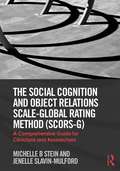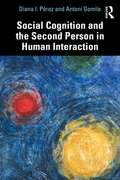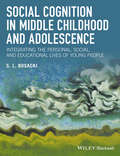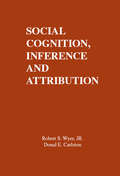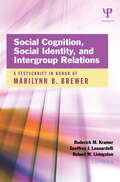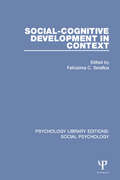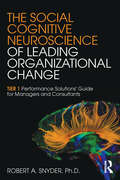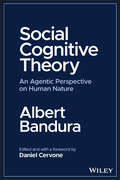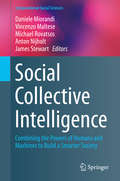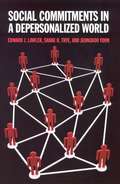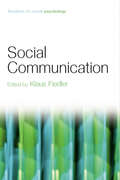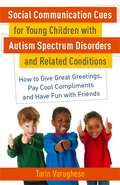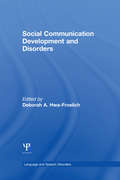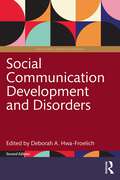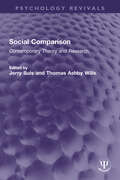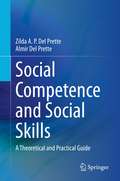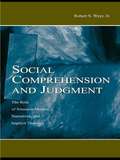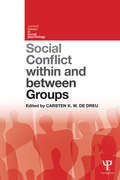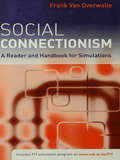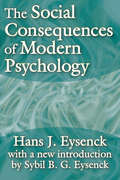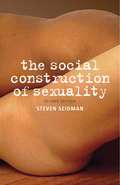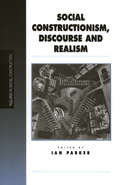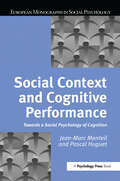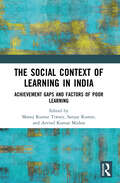- Table View
- List View
The Social Cognition and Object Relations Scale-Global Rating Method (SCORS-G): A comprehensive guide for clinicians and researchers
by Michelle Stein Jenelle Slavin-MulfordThe Social Cognition and Object Relations Scale-Global Rating Method (SCORS-G) is a clinician rated measure that can be used to code various forms of narrative material. It is comprised of eight dimensions which are scored using a seven-point Likert scale, where lower scores are indicative of more pathological aspects of object representations and higher scores are suggestive of more mature and adaptive functioning. The volume is a comprehensive reference on the 1) validity and reliability of the SCORS-G rating system; 2) in depth review of the empirical literature; 3) administration and intricacies of scoring; and 4) the implications and clinical utility of the system across settings and disciplines for clinicians and researchers.
Social Cognition and the Second Person in Human Interaction
by Diana I. Pérez Antoni GomilaThis book is a unique exploration of the idea of the "second person" in human interaction, the idea that face-to-face interactions involve a distinctive form of reciprocal mental state attributions that mediates their dynamical unfolding. Challenging the view of mental attribution as a sort of "theory of mind", Pérez and Gomila argue that the second person perspective of mental understanding is the conceptually, ontogenetically, and phylogenetically basic way of understanding mentality. Second person interaction provides the opportunity for the acquisition of concepts of mental states of increasing complexity. The book reviews the growing interest in a variety of second person phenomena, both in development and in adulthood, presenting research that shows how participants in human interaction attribute psychological states of a referentially transparent kind to each other. This review documents the spontaneous preference for face-to-face interaction, from eye contact to joint attention, from forms of vitality to communicative intentions, from interaction detection to joint action, and from synchrony to interpersonal coordination. Also looking at the implications and applications of the second person perspective within fields as diverse as art and morality, this book is fascinating reading for students and academics in social and cognitive psychology, cognitive science, neuroscience, and philosophy.
Social Cognition in Middle Childhood and Adolescence: Integrating the Personal, Social, and Educational Lives of Young People
by Sandra BosackiBridging psychological theory and educational practice, this is an innovative textbook on the emotional and social aspects of young people's development. Bosacki's Social Cognition in Middle Childhood and Adolescence, First Edition moves beyond tradition cognitivist representations of how children learn and grow, focusing on how to integrate the emotional, cognitive, moral, spiritual and social in young people's experiences. This text bridges the gap between theory and practice; analyses cutting edge research and translates it into culturally sensitive and developmentally appropriate strategies for future educational practice.
Social Cognition, Inference, and Attribution
by R. S. Wyer, Jr. D. E. CarlstonFirst published in 1979.This book developed out of a series of general discussions between the authors on research and theory in person perception and attribution phenomena. During the course of this discussion, two things became clear. First, many of the traditional approaches to investigating these phenomena, made popular during the past decade by the advent of algebraic models of information integration, were not providing answers to several fundamental questions concerning the manner in which social stimulus information is interpreted, organized, and stored in memory, and the factors that affect its retrieval and use in making judgments of the people and events to which it is relevant. Second, many fundamental issues associated with the processing of social stimulus information were relevant to phenomena investigated in a variety of traditionally segregated areas (e.g., impression formation, attribution, social comparison, interpersonal attraction, belief and opinion change, etc.). However, these commonalities were rarely identified. This appeared to result from a tendency to focus on micro-theoretical formulations developed to account for a circumscribed set of phenomena, without considering these phenomena within a broader conceptual framework. This book is an attempt to respond to these various deficiencies.
Social Cognition, Social Identity, and Intergroup Relations: A Festschrift in Honor of Marilynn B. Brewer (Psychology Press Festschrift Series)
by Roderick M. Kramer Geoffrey J. Leonardelli Robert W. LivingstonPerhaps the defining feature of humanity is the social condition -- how we think about others, identify ourselves with others, and interact with groups of others. The advances of evolutionary theory, social cognition, social identity, and intergroup relations, respectively, as major fields of inquiry have been among the crowning theoretical developments in social psychology over the past three decades. Marilynn Brewer has been a leading intellectual figure in the advancement of each of them. Her theory and research have had international impact on the way we think about the self and its relation to others. This festschrift celebrates Marilynn’s numerous contributions to social psychology, and includes original contributions from both leading and rising social psychologists from around the world. The volume will be of interest to social psychologists, industrial/organizational psychologists, clinical psychologists, and sociologists.
Social-Cognitive Development in Context (Psychology Library Editions: Social Psychology)
by Felicisima SeraficaThe relationship between the cognitive and social spheres of human functioning and their context has long been regarded by social and behavioural scientists as a central theoretical issue. By the early 1980s a number of empirical studies had further elucidated the nature of this relationship but no attempt had been made to present a coherent picture of the research and developments in this increasingly popular area of study. Originally published in 1982, the topics covered in this book filled the gap admirably. They present a view of the development of aspects of the self and of self-other relations and how these two lines of development interact within a given context. All the contributions attempt to portray the child’s developing awareness of the self in relation to the social world, but all consider it from different perspectives and in varying degrees of detail. This useful collection, by a number of well-known contributors, should still be of great value to students of developmental and social psychology.
The Social Cognitive Neuroscience of Leading Organizational Change: TiER1 Performance Solutions' Guide for Managers and Consultants
by Robert A. SnyderIn a very understandable, practical, and accessible manner, this book applies recent groundbreaking findings from behavioral neuroscience to the most complex and vexing challenges in organizations today. In particular, it addresses managing large-scale organizational changes, such as mergers and acquisitions, providing lessons and tactics that can be usefully applied to in many different settings. In addition to discussing successful practices, it also identifies the reasons that most past comprehensive, long-term change projects have failed and unmasks the counterproductive effects of the typical evolutionary or emotion-based attempts to change group and individual behavior, using neuroscience as its principal tool.
Social Cognitive Theory: An Agentic Perspective on Human Nature
by Albert BanduraA comprehensive perspective on human nature by one of the undisputed masters of the psychological sciences The final book by psychology's most eminent modern figure, Dr. Albert Bandura, is the definitive concise presentation of his theoretical views. In Social Cognitive Theory: An Agentic Perspective on Human Nature, Bandura explains how his half-century of research and theory on the determinants of thought and action highlight people's capacity for agency: the ability to exert control over one's actions and the courses of one's development. He further explains how his basic theory and research have been applied, world-wide, for the betterment of the human condition. Readers will find: A thorough introduction to the author’s agentic-perspective on human nature Dr. Bandura's theoretical analyses of moral behavior and moral disengagement Applications of the basic principles of Social Cognitive Theory to personal and social change for human betterment An essential and groundbreaking resource for educational, health, and personality psychologists, Social Cognitive Theory: An Agentic Perspective on Human Nature will also prove indispensable to social and industrial/organizational psychologists.
Social Collective Intelligence
by Daniele Miorandi Vincenzo Maltese Michael Rovatsos Anton Nijholt James StewartThe book focuses on Social Collective Intelligence, a term used to denote a class of socio-technical systems that combine, in a coordinated way, the strengths of humans, machines and collectives in terms of competences, knowledge and problem solving capabilities with the communication, computing and storage capabilities of advanced ICT. Social Collective Intelligence opens a number of challenges for researchers in both computer science and social sciences; at the same time it provides an innovative approach to solve challenges in diverse application domains, ranging from health to education and organization of work. The book will provide a cohesive and holistic treatment of Social Collective Intelligence, including challenges emerging in various disciplines (computer science, sociology, ethics) and opportunities for innovating in various application areas. By going through the book the reader will gauge insight and knowledge into the challenges and opportunities provided by this new, exciting, field of investigation. Benefits for scientists will be in terms of accessing a comprehensive treatment of the open research challenges in a multidisciplinary perspective. Benefits for practitioners and applied researchers will be in terms of access to novel approaches to tackle relevant problems in their field. Benefits for policy-makers and public bodies representatives will be in terms of understanding how technological advances can support them in supporting the progress of society and economy.
Social Commitments in a Depersonalized World
by Edward J. Lawler Jeongkoo Yoon Shane R. ThyeAs individuals’ ties to community organizations and the companies they work for weaken, many analysts worry that the fabric of our society is deteriorating. But others counter that new social networks, especially those forming online, create important and possibly even stronger social bonds than those of the past. In Social Commitments in a Depersonalized World, Edward Lawler, Shane Thye, and Jeongkoo Yoon examine interpersonal and group ties and propose a new theory of social commitments, showing that multiple interactions, group activities and, particularly, emotional attachment, are essential for creating and sustaining alignments between individuals and groups. Lawler, Thye, and Yoon acknowledge that long-term social attachments have proven fragile in a volatile economy where people increasingly form transactional associations—based not on collective interest but on what will yield the most personal advantage in a society shaped by market logic. Although person-to-group bonds may have become harder to sustain, they continue to play a vital role in maintaining healthy interactions in larger social groups from companies to communities. Drawing on classical and contemporary sociology, organizational psychology, and behavioral economics, Social Commitments in a Depersonalized World shows how affiliations—particularly those that involve a profound emotional component—can transcend merely instrumental or transactional ties and can even transform these impersonal bonds into deeply personal ones. The authors study the structures of small groups, corporations, economic transactions, and modern nation-states to determine how hierarchies, task allocation, and social identities help or hinder a group’s vitality. They find that such conditions as equal status, interdependence, and overlapping affiliations figure significantly in creating and sustaining strong person-to-group bonds. Recurring collaboration with others to achieve common goals—along with shared responsibilities and equally valued importance within an organization—promote positive and enduring feelings that enlarge a person’s experience of a group and the significance of their place within it. Employees in organizations with strong person-to-group ties experience a more unified, collective identity. They tend to work more cost effectively, meet company expectations, and better regulate their own productivity and behavior. The authors make clear that the principles of their theory have implications beyond business. With cultures pulling apart and crashing together like tectonic plates, much depends on our ability to work collectively across racial, cultural, and political divides. The new theory in Social Commitments in a Depersonalized World provides a way of thinking about how groups form and what it takes to sustain them in the modern world.
Social Communication (Frontiers of Social Psychology)
by Klaus FiedlerThis volume is devoted to the fascinating topic of social communication - fascinating because communication is ubiquitous, in that one cannot not communicate. And yet, the art of effective communication can be extremely demanding and elusive, because a tricky trade-off problem has to be solved. For communication to be successful, it must be at once informative - somehow indicating an intended direction of thought or action - as well as subtle - somehow concealing intentions and instrumental goals. Failure to meet the former criterion renders communication uncontrolled and haphazard; failure to meet the latter raises suspicion and reactance. The chapters in this volume focus on the tools and repertoires evolved by social communication in order to deal with this demanding trade-off. They represent prominent paradigms of current research at the interface of communication and social psychology, presented by leading scholars who have played crucial roles in the development of those paradigms. The sixteen chapters are grouped into four major sections: communication within and between groups and cultures; strategic communication; social communication, affect, and behaviour regulation; and social communication and adaptive behaviour regulation. Individual chapters are devoted to such intriguing topics as stereotypes and intergroup affairs, language and culture, deception and lie detection, persuasion, discussions in groups, logic of conversation, nonverbal cues, conversational implicatures, the impact of conversation situations and social distance, and the evolution of verbal communication. The volume is framed by an introduction and an epilog. Social Communication is essential reading for senior undergraduates, graduates, and researchers working in the field of social communication, language and social psychology, and related areas in social science such as communication science, linguistics, and gender studies.
Social Communication Cues for Young Children with Autism Spectrum Disorders and Related Conditions: How to Give Great Greetings, Pay Cool Compliments and Have Fun with Friends
by Tarin VarugheseChildren need effective communication skills as a foundation for successful participation in activities at home, school and in the community. Children with Autism Spectrum Disorders are often unable to learn social skills from environmental cues and require direct teaching and lots of practice. This collection of social communication cues will enable parents and professionals to help children with social development difficulties navigate their social world and enjoy interacting with their peers. Each section begins with a simple social rule; the reason why the child may be having difficulty in this area is explained; and easy communication prompts and practice ideas are provided. The younger these skills are practiced, the happier and more self-confident the child. This program is ideal for early intervention as it can be used with children aged 2 and up. This practical guide will be an essential resource for parents, teachers, speech-language pathologists, psychologists and therapists looking for a simple program for teaching social skills to young children with Autism Spectrum Disorders.
Social Communication Development and Disorders
by Deborah A. Hwa-FroelichThis new standout volume is the first to describe developmental areas associated with social competence and social communication, as well as provide evidence-based information on effective assessment and intervention for children who have problems with social communication and social interactions. Expertly crafted, the volume offers both theory and practice within one comprehensive, yet manageable resource for busy professionals. The first section covers social communication theory and associated developmental domains. Case studies are provided to exemplify how different variables may affect social communication development. The second section covers evidence-based practices for social communication disorders and includes case studies, incidence and prevalence estimates, the current DSM-V definition of the disorder, referral guidelines, recommended practices of assessment and intervention, and a list of clinical resources. Social Communication Development and Disorders is an ideal text for a range of courses in Communication Sciences and Disorders or Speech-Language Pathology, and a must-have reference for professionals working with children with social competence or social communication problems, including speech-language pathologists (SLPs), regular and special educators, psychologists, and support personnel such as social workers, counselors, and occupational therapists.
Social Communication Development and Disorders (Language And Speech Disorders Ser.)
by Deborah A. Hwa-FroelichSocial Communication Development and Disorders examines the integrated development of social, linguistic, and cognitive functions. It provides evidence-based clinical information on effective assessment and intervention for individuals with social communication disorders. The second edition of this standout text is fully updated to reflect up-to-date research evidence and the application of the International Classification of Functioning, Disability and Health (Children and Youth version), and places a strong focus on cultural differences in social communication and extended developmental information from birth to adulthood. Part 1 explores topics including theoretical perspectives on social communication, neuroscience of social communication and social cognitive, social emotional, and social communication development. Part 2 covers social pragmatic communication disorder and associated disorders such as language impairment, autism spectrum disorder, attention deficit disorder and disruptive behavior disorder. Chapters feature case studies, incidence/prevalence estimates, DSM-5 definitions, referral guidelines, recommended assessment and intervention practices, as well as a list of clinical and instructional resources. This comprehensive and practical text is essential reading for both undergraduate and graduate students of communication sciences, speech and language disorders, as well as speech-language pathology. It is also an excellent reference for professionals working with individuals with social competence or social communication problems, including speech-language pathologists, teachers, psychologists, social workers, counsellors, school nurses, behavioral therapists, and occupational therapists.
Social Comparison: Contemporary Theory and Research (Psychology Revivals)
by Jerry Suls Thomas Ashby WillsAssessment of abilities, opinions, and overall feelings of self-worth, are commonly acknowledged to be influenced by how ones’ attributes compare with those of other people. In contemporary social psychology, this process is known as social comparison or interpersonal comparison. Originally published in 1991, this volume presents the most recent developments in this field of study at the time. As described in the chapters the theory has gone through several iterations, taken on new problems and research paradigms, and reached out to other social-psychological areas of study. Some of this research addresses questions that are logical extensions of Festinger’s theory; some consider questions that derive from entirely different ways of construing the comparison process from Festinger’s original approach. Although all questions are not settled, the work presented here shows how far the original social comparison theory has evolved and suggests where the next insights are likely to be found. Today it can be read in its historical contex
Social Competence and Social Skills: A Theoretical and Practical Guide
by Zilda A. Del Prette Almir Del PretteThis book is a theoretical and practical guide in the field of social skills and social competence, based on decades of experience gained by the authors as researchers and professionals in psychology. The book was written for students and professionals who are involved in some way improving individuals´ social skills in different contexts, such as clinical, educational, organizational and community settings. The authors present the conceptual foundations, procedures, techniques, strategies and practical guidelines for planning and conducting effective programs aimed to social skills and social competence.In the first part of the book, key concepts and fundamentals on the area are presented, as well as the basic behavioral classes of social skills and their non-verbal and paralinguistic components. The authors also propose a portfolio for the assessment of clients’ social skills deficits and strengths to thereby define the aims and procedures of interventions.The second part focuses on guidelines to select and use procedures and techniques for promoting social skills and social competence. The authors present experiential activities that they created in previous interventions and that were tested in their research, showing evidence of effectiveness. Suggestions on how to evaluate participants’ repertoires and how to use these ideas in intervention planning are also described. Finally, in the third part of the book, the authors go further presenting practical guidelines for planning and conducting programs and sessions to promote social skills and social competence, in either group or individual settings.
Social Comprehension and Judgment: The Role of Situation Models, Narratives, and Implicit Theories
by Robert S. Wyer, Jr.Written by one of the foremost authorities in social cognition, Social Comprehension and Judgment examines how people process information encountered in their everyday lives. In the book, Dr. Wyer proposes a new theory about the way in which information acquired in everyday life is comprehended and represented in memory, and how it is later used as a basis for judgments and decisions. A major emphasis throughout is on the construction and use of narrative representations of knowledge and the way that visual images influence the comprehension of these narratives and the judgments based on them. The role of affective reactions in this cognitive activity is also discussed. Social Comprehension and Judgment is divided into three sections. Part I provides a conceptual overview by outlining the general theoretical framework focusing on assumptions about the storage and retrieval of information and reviews recent research on the impact of knowledge accessibility on judgments and decisions. Part II deals with the comprehension of information, and examines the role of these processes in impression formation, persuasion, and responses to humor. Part III describes the inferences that are based on information conveyed in social situations. This book is ideal for advanced students and researchers interested in the areas of social cognition or social information processing.
Social Conflict within and between Groups
by Carsten K. W. De DreuIntergroup competition and conflict create pervasive problems in human society, giving rise to such phenomena as prejudice, terrorism, ethnic cleansing, and interstate war. Citizens, policy makers, social workers, schoolteachers, and politicians wrestle with these problems, and with difficult questions these issues pose: What causes conflict to escalate? How should we manage conflict within communities, and also in society at large? Is conflict always bad, or does it have other more beneficial consequences? Social Conflict within and between Groups provides an overview of contemporary research from the social sciences on these questions. It brings together the research output of a number of leading researchers in psychology, management and economics, sociology and political science, and draws on the outcomes of ten prominent research programs conducted over the past five years. The chapters cover a range of fascinating topics, including prejudice and discrimination in multi-ethnic societies, and conflict and negotiation in the field of industrial relations. The authors also consider the possibilities for intervention at the interpersonal, intergroup and societal level. This is the first volume to provide an interdisciplinary overview of the various scientific approaches to studying the origins and consequences of social conflict. It will be of great interest to researchers, graduates and upper-level undergraduate students from across the social and behavioural sciences.
Social Connectionism: A Reader and Handbook for Simulations
by Frank Van OverwalleMany of our thoughts and decisions occur without us being conscious of them taking place; connectionism attempts to reveal the internal hidden dynamics that drive the thoughts and actions of both individuals and groups. Connectionist modeling is a radically innovative approach to theorising in psychology, and more recently in the field of social psychology. The connectionist perspective interprets human cognition as a dynamic and adaptive system that learns from its own direct experiences or through indirect communication from others. Social Connectionism offers an overview of the most recent theoretical developments of connectionist models in social psychology. The volume is divided into four sections, beginning with an introduction and overview of social connectionism. This is followed by chapters on causal attribution, person and group impression formation, and attitudes. Each chapter is followed by simulation exercises that can be carried out using the FIT simulation program; these guided exercises allow the reader to reproduce published results. Social Connectionism will be invaluable to graduate students and researchers primarily in the field of social psychology, but also in cognitive psychology and connectionist modeling.
The Social Consequences of Modern Psychology
by Hans EysenckIn The Social Consequences of Modern Psychology Eysenck takes the position that social science has real substance, and its findings ought to be applicable to social problems of our times. Although there is little that scientists can do about war and its prevention, or about social unrest and upheaval, or about strikes and other confrontations, there are a number of questions to which we can give tentative answers. This book deals with some of these questions, and finds some of the answers.Eysenck begins with a look at a paradox of modern psychology. Experimental psychologists use strictly scientific methods to investigate what to many people seem trivial and sterile problems, yet some social psychologists, psychiatrists and psychoanalysts investigate what are clearly important and socially relevant problems, but use methods and theories whose scientific rigor is doubtful at best. This paradox is artificial and unnecessary. Methods of investigation and theories and concepts enable us to combine worthwhile problems and rigorous methods.The book takes a long look at a particular problem which Eysenck investigated in depth during his illustrious lifetime. This tour de force, by one of the magisterial figures of modern psychology, is written for people as well as about people. It is not a rehash of the voluminous writings of lawyers, poets, politicians, dramatists, historians, psychiatrists and others who have felt compelled to write about these psychological matters without even a smattering of psychological knowledge. It is, instead, based on empirical investigations that are too often declared to be nonexistent by publicists and politicos.
Social Construction of Sexuality
by Steven SeidmanIn The Social Construction of Sexuality , Steven Seidman investigates the political and social consequences of privileging certain sexual practices and identities while stigmatizing others. Addressing a range of topics from gay and lesbian identities to sex work, he delves into issues of social control that inform popular beliefs and moral standards. The Second Edition of The Social Construction of Sexuality features a new part that focuses on sexuality and social institutions.
Social Constructionism
by Vivien BurrNow in its third edition, this successful book introduces students to the area of social science theory and research known as social constructionism. Using a variety of examples from everyday experience and from existing research in areas such as personality, sexuality and health, it clearly explains the basic theoretical assumptions of social constructionism. Key debates, such as the nature and status of knowledge, truth, reality and the self are given in-depth analysis in an accessible style. Drawing on a range of empirical studies, the book clearly defines the various different approaches to social constructionist research and explores the theoretical and practical issues involved. While the text is broadly sympathetic to social constructionism, it also adopts a critical perspective to the material, addressing its weaknesses and, in the final chapter, subjecting the theory itself to a more extensive critique. New to this edition: Extended coverage of the relationship between 'mainstream' psychology and social constructionism and how the two fields can engage with each other. An exploration of the rise and popularity of neuroscience and the challenge it poses to social constructionism. New material on the field of psychosocial studies. Updated coverage of existing key issues such as age and sexuality, and inclusion of more recently emerging issues (e.g. status and role of affect). Updated discussion of key social constructionist contributors, with revised references. Updated chapter on research methods, including more on narrative and critical narrative analysis, and personal construct methods. The third edition of Social Constructionism extends and updates the material covered in previous editions and will be an invaluable and informative resource for undergraduate and postgraduate students across the social and behavioural sciences.
Social Constructionism, Discourse and Realism (Inquiries in Social Construction)
by Professor Ian PatrickThis book charts a clear and accessible path through some of the key debates in contemporary psychology. Drawing upon the wider critical and discursive turn in the human sciences, Social Constructionism, Discourse and Realism explores comprehensively the many claims about what we can know of `reality' in social constructionist and discursive research in psychology. Relativist versus realist tensions go to the heart of current theoretical and methodological issues, not only within psychology but across the social and human sciences. By mapping the connections between theory, method and politics in social research and placing these within the context of the broader social constructionist and discursive debates, the internationally renowned contributors offer the reader an invaluable survey of the debates.
Social Context and Cognitive Performance: Towards a Social Psychology of Cognition (European Monographs in Social Psychology)
by Pascal Huguet Jean-Marc MonteilBased on twenty years of research on the social regulation of academic performances, this book offers theoretical and empirical arguments in favour of the inclusion of the social dimension of human beings as essential for their cognitive activities. We all engage in social interactions, compare ourselves with other people, belong to social groups, and are the object of a myriad of categorisations. Not only do such social experiences affect cognition, but they actually determine its form and its content. Several experiments indeed reveal that cognitive performance depends on the relationship between the individual and the social context in which cognition takes place. And this relationship is not forged directly by features of the situation, but rather by personal construals of these features (most notably social comparison). This fact alone justifies granting the individual's social experiences a psychological status and it further strengthens the key idea of this book, namely that the social context only exists through the intervention of cognitive processes of contextualization (producing a "cognitive context of the self") such as those involved in autobiographical memory. A "social psychology of cognition" is suggested, in which the fashionable distinction between cognition and social cognition makes no sense. From this innovative perspective it is indeed more the social nature of the individual rather than that of the object to be processed that defines the social nature of cognition. Well-known phenomena such as social facilitation and social loafing as well as established educational practices are also re-examined from this perspective.
The Social Context of Learning in India: Achievement Gaps and Factors of Poor Learning
by Manoj Kumar Tiwary, Sanjay Kumar, and Arvind Kumar MishraWhy are children from disadvantaged and minority communities overrepresented among academic underachievers, poor learners, and school dropouts? This volume engages with this question and examines classroom learning as a process that involves a multitude of actors situated in specific social, cultural, and historical contexts. The volume covers an interdisciplinary spectrum of educational processes, contexts, educational ambitions, and limitations of low-caste, working-class, and middle-class students from different Indian communities and regions. The volume delves into the problem of academic underperformance from a social identity perspective and probes into social context-based variability in classroom learning, systemic disadvantages in the form of negative stereotypes, and the family as an under-studied social group in all discussions of schooling. It also examines the teachers’ perceptions and attitudes towards Adivasi students and other minority groups in primary schools and their effect on children’s classroom engagement. The chapters in this volume provide insights into unresolved and critical research questions that require the attention of teachers, school management, educators, and policymakers alike. This book will also be useful for academicians, policymakers, teacher educators, pedagogic practitioners in India and abroad, and state and central government institutions working on school education, educational psychology, policymaking in education, learning methods, and research on educational enhancement.
